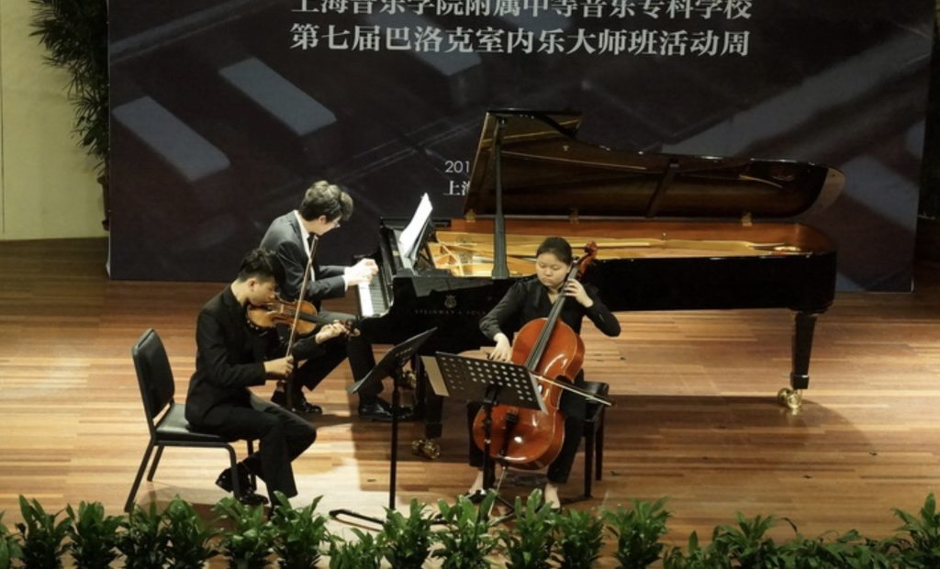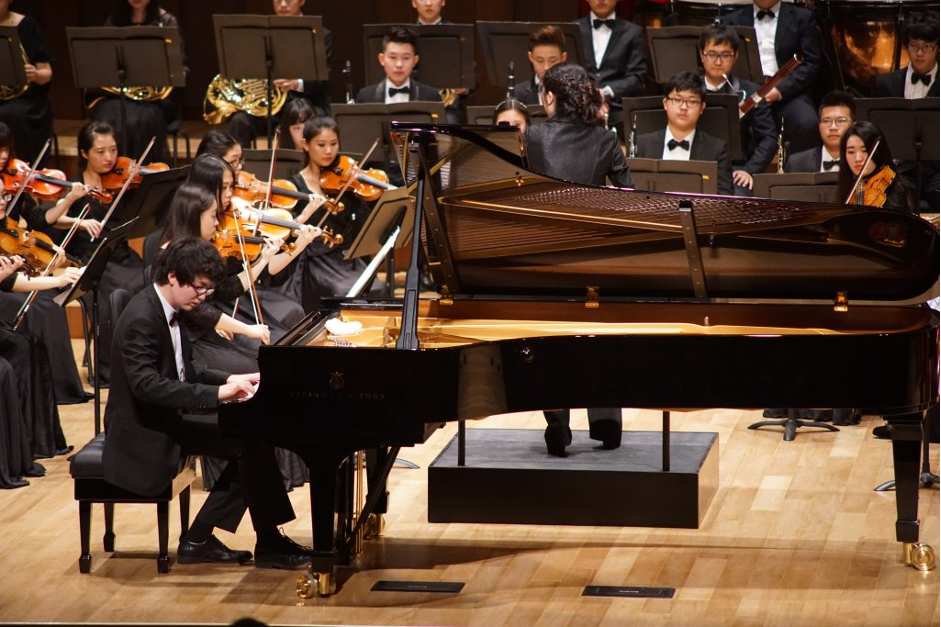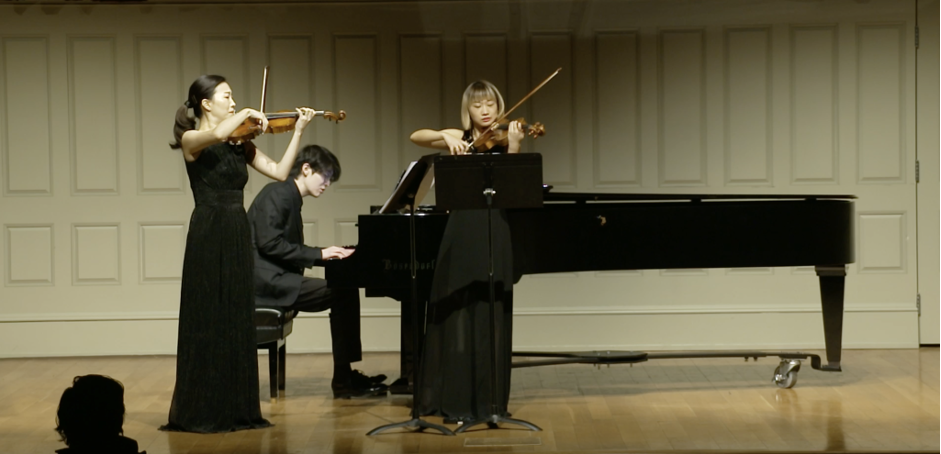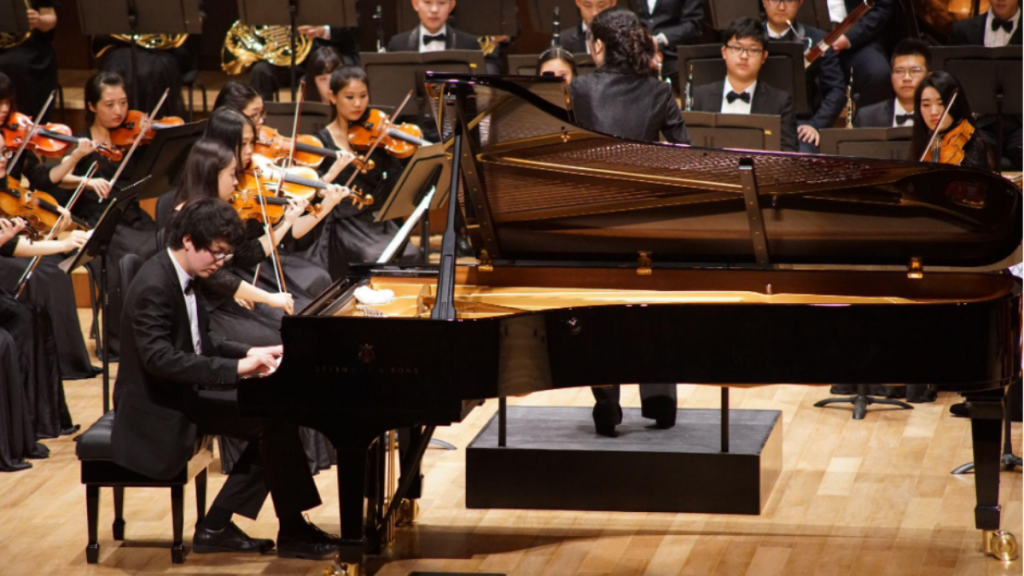Today, the music industry embraces a multitude of genres, an array of formats, and a blend of traditional and modern approaches, making it a vibrant field where talent and innovation thrive. Among the myriad of musical expressions, classical music holds a unique place, with its timeless charm, profound emotions, and historical significance. As we delve into the realm of classical music, the name Xiaohe Liu certainly strikes a note.
Xiaohe Liu is a classical pianist of extraordinary caliber, whose performances have resonated with audiences across the globe. Born in China, Xiaohe’s passion for music was ignited at an early age, leading him on a journey marked by countless prestigious performances, collaborations, and accolades. His musical prowess has seen him grace illustrious stages across Asia, Europe, and North America, earning him widespread recognition and respect in the realm of classical music.
Xiaohe’s career is characterized by both solo and chamber music performances, illustrating his versatility and adaptability as a musician. The Bolzano Bozen Piano Festival in Italy and the Baroque Chamber Music Festival in Shanghai are but a few examples of the grand stages that have echoed with his music. His performances, imbued with emotional depth and technical proficiency, have earned him the admiration of fellow musicians and the appreciation of audiences worldwide.
At the Bolzano Bozen Piano Festival, Xiaohe performed a solo recital, captivating the audience with his melodic interpretations and technical prowess. In contrast, the Baroque Chamber Music Festival in Shanghai offered him the opportunity to indulge in the dynamic world of ensemble performances. Both experiences showcased his artistic range and his ability to connect with diverse audiences.
Xiaohe has not only thrived as a solo artist but also excelled in his collaborations with orchestras, including the prestigious Xi’an Conservatory orchestra. These collaborations have further enriched his musical journey, enabling him to navigate complex compositions and establish a deep connection with fellow musicians.
Recently, we had the honor of interviewing Xiaohe Liu, delving deeper into his extensive experience performing solo and chamber music. We explored his most memorable performances, his approach to music interpretation, and his unique perspective on the role of classical music in contemporary society. The conversation offered fascinating insights into Xiaohe’s unwavering dedication to his craft and his remarkable journey as a musician.
Join us on this extraordinary conversation where music takes on a life of its own and dreams come alive on the keys of a piano.
Hello, Xiaohe. Can you tell us about your experience performing in the Baroque Chamber Music Festival in Shanghai? What was the highlight of that experience for you?

Xiaohe Liu’s Performance at the Baroque Festival
Participating in the 7th Baroque Chamber Music Festival at the Shanghai Conservatory of Music was a transformative experience that had a profound impact on my musical career and personal development. This esteemed event is celebrated for its focus on the intricate compositions of the Baroque period and historically informed performances.
The highlight of the experience was, unquestionably, collaborating with extraordinary musicians united by a shared passion for music. The festival brought together an impressive array of chamber music masters to lead masterclasses and seminars. These included remarkable individuals such as Weicong Zhang, a Manhattan School of Music graduate who has performed at Carnegie Hall and collaborated with musicians globally, and Yingdi Sun, the gold award recipient at the 7th Franz Liszt International Piano Competition.
Sun, a piano professor at the Shanghai Conservatory of Music, was invited to perform at the Great Hall of the People for President Xi Jinping and other visiting state heads in 2014. The festival also convened an ensemble of gifted instrumentalists, including celebrated violinists, cellists, flutists, and pianists. Collaborating with these accomplished musicians and observing their performances was both educational and inspirational.
The festival’s meticulously selected repertoire included works not only by prominent Baroque composers such as Johann Sebastian Bach, George Frederic Handel, and Antonio Vivaldi but also by classical composers like Franz Schubert and Mozart. The challenge and immense joy of exploring these masterpieces’ complexities and rendering them in a historically informed manner were deeply enriching.
One particularly memorable experience was our performance of Schubert’s Piano Trio No 1 Op 99 D 898 at the festival’s closing ceremony. We attended several masterclasses led by Weicong Zhang on this piece prior to the performance, leaving us with two days to reflect on and implement the comments and suggestions.
The three of us worked closely together, experimenting with numerous ideas to discover the perfect sound that encapsulates Schubert’s music and the classical period, while preserving our distinct voices and interpretations. Under the maestro’s guidance, our final performance showcased noticeable improvement, reflecting our growth and development.
How did you prepare for your solo recital at the Bolzano Bozen Piano Festival in Italy? Were there any specific challenges you encountered during the preparation process?
The preparation for my solo recital at the Bolzano Bozen Piano Festival in Italy was an intense and thrilling journey. To deliver a performance that would be remembered, I committed a significant amount of time and effort to ensure a refined and artistically appealing presentation.
The initial step was carefully curating a repertoire that not only highlighted my musical abilities but also harmonized with the festival’s theme. This required comprehensive research, studying a variety of composers and their works, and eventually designing a program that offered a blend of virtuosity, emotional depth, and stylistic variety. The chosen pieces, including J.S. Bach’s Partita No.2, F. Schubert’s Wanderer Fantasy, F. Chopin’s Scherzo No.3, and Polonaise Fantasy, spanned hundreds of years and covered three periods, providing an excellent showcase of musical evolution.
One particular challenge during the preparation process was dealing with performance anxiety. Traveling to Italy for the first time and encountering master musicians from around the globe made everything feel unfamiliar, which increased my stress levels. To perform well under these circumstances, I concentrated on mastering the technical requirements of the chosen pieces. Each piece presented its unique set of intricate passages, challenging fingerings, and complex musical structures.
To overcome these challenges, I diligently practiced scales, arpeggios, and etudes to enhance my technical skills, aiming for a higher level of precision and control. In addition, achieving absolute familiarity with the music through countless hours of practice and attentive listening enabled me to maintain a high-quality performance under pressure, even in somewhat distracted situations.
Another challenge was finding the right balance between technical accuracy and artistic expression. It was crucial to not only execute the notes impeccably but also to express the emotional depth and musicality inherent in each piece. This exploration involved making various interpretative choices, experimenting with different phrasing and dynamics, and striving to bring out each piece’s unique character.
Lastly, adapting to different pianos presented its own challenge. However, through thorough practice and flexibility, I made sure I could deliver a consistent and engaging performance regardless of the instrument’s distinct characteristics.
Could you share a memorable collaboration you had with an orchestra, such as the Xi’an Conservatory orchestra? What was it like performing with a symphony orchestra, and how did it enhance your musical expression?

Xiaohe Liu’s Performance with Xi’an Conservatory Orchestra
The experience of performing with a symphony orchestra is unparalleled. It elevates the musical expression and adds a profound dimension to one’s performance. My collaboration with the Xi’an Conservatory Orchestra was an extraordinary opportunity that allowed me to combine my artistry with the collective brilliance and richness of a full symphonic ensemble. This orchestra, comprising highly skilled musicians, provided a robust foundation and a spectrum of vibrant colors that accentuated my musical interpretation.
Being part of a symphony orchestra performance is both inspiring and humbling. As I sat adjacent to the conductor, the enormity of the sound, the precise synchronicity of the ensemble, and the palpable energy created an experience beyond verbal articulation.
One of the primary challenges of performing with an orchestra, especially in the context of a piano concerto, is the critical role the pianist plays. Any errors or discrepancies can potentially disrupt the orchestra, leading to confusion. To honor the collective efforts of the conductor and fellow musicians, it was essential for me to prepare Chopin’s Piano Concerto No.1 meticulously.
This preparation was not limited to memorizing my part but also understanding precisely when the orchestra enters and exits in every section of the piece. Moreover, aligning my interpretation with the conductor’s vision was pivotal. This collaborative nature of the performance fostered a sense of mutual trust and respect as we navigated towards a shared musical goal.
One of the most remarkable aspects of performing with the Xi’an Conservatory Orchestra was the musical dialogue during the piano concerto. The interplay between the piano and the different sections of the orchestra, each responding to and building upon the other’s musical ideas, was a source of immense joy and inspiration. The intertwining melodies of the strings, brass, and woodwinds with the piano’s voice created an intricate tapestry of sound that was exhilarating and deeply moving.
Moreover, this experience with the symphony orchestra broadened my musical perspective. It enabled me to understand the nuances of orchestration, the delicate balance of voices, and the art of blending individual contributions into a harmonious whole. This encounter deepened my understanding of the orchestral repertoire and greatly enriched my musical sensibilities.
Can you describe the repertoire you performed during your chamber music performances? What drew you to chamber music, and how does it differ from performing as a soloist?

2023 Concert Artist International Competition
The experience of performing with a symphony orchestra is unparalleled. It elevates the musical expression and adds a profound dimension to one’s performance. My collaboration with the Xi’an Conservatory Orchestra was an extraordinary opportunity that allowed me to combine my artistry with the collective brilliance and richness of a full symphonic ensemble. This orchestra, comprising highly skilled musicians, provided a robust foundation and a spectrum of vibrant colors that accentuated my musical interpretation.
Being part of a symphony orchestra performance is both inspiring and humbling. As I sat adjacent to the conductor, the enormity of the sound, the precise synchronicity of the ensemble, and the palpable energy created an experience beyond verbal articulation.
One of the primary challenges of performing with an orchestra, especially in the context of a piano concerto, is the critical role the pianist plays. Any errors or discrepancies can potentially disrupt the orchestra, leading to confusion. To honor the collective efforts of the conductor and fellow musicians, it was essential for me to prepare Chopin’s Piano Concerto No.1 meticulously.
This preparation was not limited to memorizing my part but also understanding precisely when the orchestra enters and exits in every section of the piece. Moreover, aligning my interpretation with the conductor’s vision was pivotal. This collaborative nature of the performance fostered a sense of mutual trust and respect as we navigated towards a shared musical goal.
One of the most remarkable aspects of performing with the Xi’an Conservatory Orchestra was the musical dialogue during the piano concerto. The interplay between the piano and the different sections of the orchestra, each responding to and building upon the other’s musical ideas, was a source of immense joy and inspiration. The intertwining melodies of the strings, brass, and woodwinds with the piano’s voice created an intricate tapestry of sound that was exhilarating and deeply moving.
Moreover, this experience with the symphony orchestra broadened my musical perspective. It enabled me to understand the nuances of orchestration, the delicate balance of voices, and the art of blending individual contributions into a harmonious whole. This encounter deepened my understanding of the orchestral repertoire and greatly enriched my musical sensibilities.
Share with us your experience performing at the opening concert of the 2016 Xi’an Conservatory of Music Piano Art Festival. How did it feel to be part of such a prestigious event, and how did the audience respond to your performance?
The invitation to perform at the Xi’an International Piano Art Festival was an honor and an exhilarating experience for me. As any pianist will attest, participating in such a prestigious event represents a significant milestone in China’s artistic landscape.
Performing at large, esteemed venues like the Xi’an Artistic Center, and engaging in masterclasses conducted by renowned musicians from around the world, provided invaluable opportunities for growth, learning, and networking. The festival boasted a lineup of world-class musicians, including Ying Wu, the president of the Piano Society of the Chinese Musicians’ Society, and other luminaries such as Shaoyi Dan, Yunjie Wu, and Danwen Wei.
Participating in such a prestigious event was an honor that allowed me to refine my skills and absorb new learning experiences. The audience was incredibly warm and receptive. Their applause and recognition bolstered my confidence, affirming that my relentless pursuit of mastery and my commitment to music was appreciated and valued.
Naturally, performing at high-profile events like this one comes with its own set of nerves. The constant fear of potential mistakes or mishaps is always in the back of the mind. But the performance was well-executed and was warmly received by the audience, which was immensely gratifying.
One of the highlights of the festival was the masterclass I attended, conducted by Shaoyi Dan. This class provided an opportunity to gain invaluable insights and feedback, enriching my overall experience at the festival. Being a part of this prestigious event was truly special and it served to reinforce my dedication to my musical journey.
As you performed in various countries across Asia, Europe, and North America, did you notice any cultural differences in audience engagement? How did you adapt to these differences, and did they influence your performance style?
Classical music, like any form of art, holds unique cultural significance and embodies distinct historical developments across various regions. These regional disparities play a substantial role in shaping audience attitudes towards music and their appreciation for it. Each region harbors unique norms, expectations, and responses to live performances, which invariably influence my performance style and repertoire selection.
In Asia, particularly in countries like China, audiences tend to be more reserved and attentive during performances. They emphasize respect for the artist and a culture of focused listening. The applause may be more subdued between pieces during a recital, but the appreciation is deeply felt, often focusing on technical proficiency.
On the contrary, European audiences often demonstrate a rich cultural heritage of classical music appreciation. Given that classical music has deeply rooted origins in their culture, audiences are knowledgeable and passionate about the repertoire. Their engagement is evident through frequent, enthusiastic applause and vocal expressions of appreciation. European audiences are often well-versed in the nuances of classical music, actively responding to the interpretation and musicality presented.
North American concert culture is vibrant and diverse. Audiences here tend to be more demonstrative in expressing their enthusiasm and appreciation through applause and vocal reactions. The atmosphere often fosters a more informal and interactive sense of connection between the performer and the audience. There also appears to be more acceptance for freer interpretations.
These cultural variations subtly influence my performance style. For instance, in regions where audiences are more reserved, I might focus more on conveying subtlety and emotional nuances, allowing the music to communicate on its own terms. On the other hand, in regions with more expressive audiences, I might emphasize dynamic contrasts and engage in more direct communication with listeners. Ultimately, my goal is to strike a balance between staying true to my artistic interpretation while also being responsive to the cultural norms of each specific region.
What is your approach to balancing the interpretation of the composer’s intentions with adding your own artistic expression during your solo performances? How do you ensure that your interpretations resonate with the audience?
Striking a balance between honoring the composer’s intent and expressing personal creativity indeed represents a fine art. It’s critical to respect the composer’s original vision, while also letting the music serve as a conduit for personal expression.
My first step towards achieving this balance involves conducting a comprehensive study of the composition. This includes researching its historical context, understanding the life and influences of the composer, and familiarizing myself with the musical styles prevalent during the period the piece was composed. This understanding enables me to grasp the composer’s intentions and the messages they intended to convey through their music.
Post this research phase, I deeply internalize the music, connecting with the emotional content of the piece, identifying its underlying narratives, and embracing the score’s expressive possibilities. This process allows me to emotionally connect with the music and build a personal relationship with it.
While respecting the composer’s intent, I also strive to infuse my interpretation into the music. This involves exploring various possibilities for phrasing, dynamics, and tempo, and experimenting with different nuances and colors to bring out my unique musical voice. This exploration facilitates a personal connection with the music and enables me to convey my emotional journey to the audience. However, these personal expressions and artistic choices always stem from what is already present in the score. For instance, if the harmonies in a piece bear a distinctly dark color, I might choose to play with a softer touch or emphasize the bass, thus aligning my interpretation with the composer’s intent.
Feedback from fellow musicians and masters also plays a crucial role in refining my interpretation. Some individuals may have a deeper understanding of a particular piece, and their insights can prove invaluable. If a significant number of listeners suggest that my interpretation strays too far from the original intent or lacks personal flair, I remain open to reevaluating and adjusting my approach.
In the end, the objective is to respect and honor the composer’s intent while adding a personal touch that enhances the music and makes it uniquely my own. It is indeed a delicate balance, but achieving it can result in deeply meaningful and captivating performances.
Can you share an instance where you faced a particularly challenging piece of music and how you overcame the difficulties? How did you approach the learning process and ensure a successful performance?
This is indeed an intriguing question, as no piece of music is without its challenging aspects. The idea that a composition can be straightforward enough to be flawlessly performed on the first attempt is a misconception. Even the simplest looking pieces often harbor challenging elements. Each piece, each composer, presents its own unique set of challenges.
Often, I find myself contemplating what it is that differentiates one composer’s sound from another’s. Are these differences more musical or technical in nature? Thus, when confronted with musical or technical difficulties, my first step is always to research the composer. Then, I engage in slow and mindful practice, employing repetition as a key tool for mastering difficult passages.
If the challenge lies more on the musical side, I will vocalize the piece and explore different interpretations from a variety of performers. This exercise allows me to understand the range of possibilities for interpreting the piece and helps me develop my unique take on it.
Subsequently, I create a plan for how I want to shape the piece, which includes decisions on phrasing, dynamics, and tempo among other elements. Once I’ve finalized this plan, I annotate it on the sheet music to ensure that I remember and maintain consistency each time I play the piece.
Playing music isn’t just about the act of performing. It’s also about thorough research and exploration of how you want the music to sound and how to achieve that desired sound. Every challenge in a piece is a new learning opportunity that helps me grow and develop as a musician.




